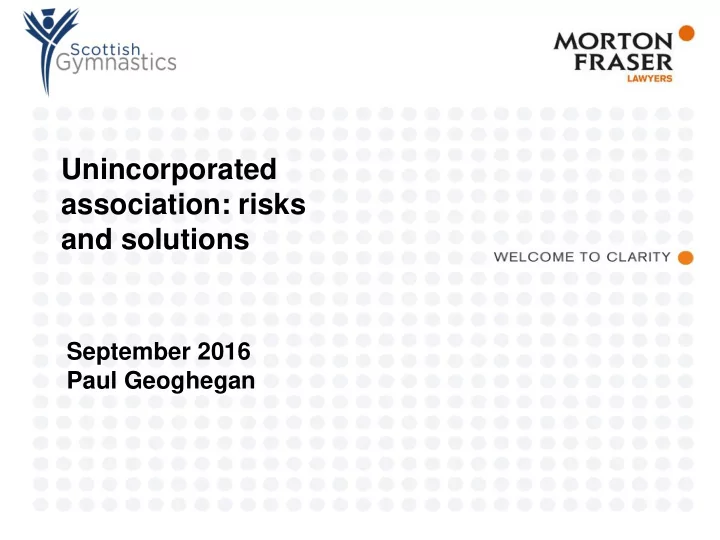

Unincorporated association: risks and solutions September 2016 Paul Geoghegan
What is an unincorporated association? • No statutory definition • “…two or more persons bound together for one or more common purposes, not being business purposes, by mutual undertakings, each having mutual duties and obligations, in an organisation which has rules which identify in whom control of it and its funds rests and upon what terms and which can be jointed or left at will” – Lawton LJ, Conservative & Unionist Central Office v Burrell • Key criteria:- • Two or more members with a common non-business purpose • Contractual relations between those persons • Governed by rules • Non-temporary • One of the most common legal form adopted by members’ clubs, sports clubs, charities and other not-for-profit organisations in Scotland
Legal Status • No separate legal personality from its members • Creates a number of issues: • Contracts • Liability in delict • Property • Employees • Title to sue or be sued
Contracts • No capacity to enter into contracts in its own name • Contractual responsibilities must be undertaken by members – usually committee members • Issues: • Not obvious to third party who they are contracting with • Members assuming personal liability under contracts on behalf of unincorporated association • Davies v Barnes Webster & Sons Limited
Liability in delict • Delict is “…the obligation upon a person to compensate for harm suffered as a result of their wrongful actions” • The law is presently unclear • If harm arises as a result of an act or omission not authorised by members, committee members may face personal liability • If harm arises as a result of an act or omission authorised by members, wider membership may all be at risk of personal liability
Property • Unincorporated association cannot hold title to property • Title to any property of an unincorporated association, or its interest as tenant under a lease, must be held by individuals on behalf of the association • Composition of management committee is likely to change more frequently than the location of the association’s premises • Another conveyance or assignation required or title/interest remains held by individuals who are no longer office-bearers or members
Employees • Unincorporated association cannot employ staff • Who is employer? Affleck v Newcastle • Newcastle and North Staffordshire Play Council
Title to sue and be sued • In Court of Session, unincorporated sued by calling association and committee members representing it • If unincorporated association wishes to raise legal proceedings in the Court of Session, would do so in name of committee members or other authorised members • In Sheriff Court, unincorporated association may sue or be sued in its own name without addition of committee members – successful pursuer my however have difficulties enforcing decree against unincorporated association • Approach to Court of Session usually adopted for Sheriff Court actions
Scottish Association with Legal Personality (SALP) • In 2008 Scottish Law Commission publishes discussion paper concluding current law is unsatisfactory and in need of reform • In 2009, Scottish Law Commission publishes a report and draft Bill proposing a new legal status for unincorporated associations - Scottish Association with Legal Personality (SALP) • SALPs would have separate legal personality and would be able to, in their own name: • Enter into contracts • Own property • Employ staff • Sue or be sued without the need to have committee members named • In 2012, Scottish Office publishes consultation report “Reforming the law on Scottish unincorporated associations and criminal liability of Scottish Partnership” • Later in 2012, Scottish Office publishes report on consultation concluding further work required on proposals • No further developments
Do not panic… • What can committee members do with what they have? • What can they do to change things?
What to do with what you have • Review your constitution • Understand what the association does • Indemnity? • Insurance?
What to do to change things? • Consider incorporation • Special considerations when dealing with a charity
What legal form? • Company limited by guarantee • Scottish Charitable Incorporated Organisation (SCIO)
Company limited by guarantee • separate legal personality • limited liability for members • regulated by Companies House in Edinburgh • can be incorporated on same day basis
Company limited by guarantee - Advantages • quick to incorporate (can be same day basis) • separate legal personality • limited liability for members • may be of assistance with securing grants • transparency – information on public record
Company limited by guarantee - Disadvantages • more administration than unincorporated associations • increased costs • greater degree of scrutiny
SCIO • separate legal personality • registered charity • limited liability for members • regulated by Office of Scottish Charity Regulator (OSCR)
SCIO - Advantages • separate legal personality • benefits of being a charity (e.g. grant funding, gift aid, rates and tax relief etc) • public perception • limited liability for members • transparency – certain information on public record
SCIO - Disadvantages • lengthy application process (at least 3 months) • cease to exist without charitable status • increased costs • greater degree of scrutiny
What’s the process? • Members must agree incorporation • Due diligence • Transfer of assets and liabilities
Some issues we’ve come across • Who are the members? • Employees/pensions • Contracts • Other regulators • The bank
Conclusion • Plenty of organisations operate as unincorporated associations without incident • But it can go wrong… • Look at existing structure and be clear about risks. This may include considering whether to change legal form. • Plan any change well in advance • Seek legal advice!
Resources • SLC Discussion Paper 2008 http://www.scotlawcom.gov.uk/files/8412/7877/4124/dp140.pdf • SLC Report 2009 http://www.scotlawcom.gov.uk/files/3312/7989/7412/rep217.pdf • UK Government’s response to consultation 2012 https://www.gov.uk/government/uploads/system/uploads/attachment _data/file/69171/Consultation-Response-Partnerships-Bill.pdf
Paul Geoghegan, Senior Associate paul.geoghegan@morton-fraser.com 0131 247 3198
Recommend
More recommend